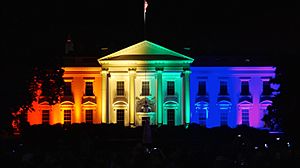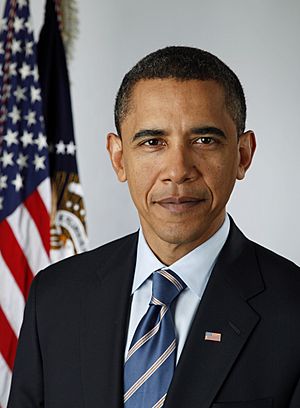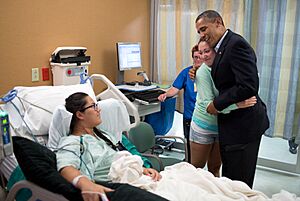Social policy of the Barack Obama administration facts for kids
Barack Obama's social policies were a mix of ideas. In 2006, experts rated his policies as more liberal than most of the U.S. Senate. This means he often supported ideas that aimed to help people through government programs and ensure equal rights for all.
Contents
- Supporting Stem Cell Research
- Helping People with Disabilities
- Promoting LGBT Rights
- Education on Safety and Health
- Fighting HIV
- Improving Healthcare
- Protecting the Environment
- Addressing Racial Issues
- Law Enforcement and Justice
- Internet Rules
- Voting Rights
- Religion and Government
- Immigration Policies
- Gun Policy
- See also
Supporting Stem Cell Research
Obama supported embryonic stem cell research. This type of research uses very early human cells to study and potentially treat diseases. He helped create a bill in 2005 that would have allowed more of this research. However, President Bush stopped the bill. Obama believed this research was important for finding new cures. In 2009, as president, Obama signed an order that allowed more of this research to happen.
Helping People with Disabilities
Obama was a strong supporter of disability rights. He was the only presidential candidate from his party to speak out about issues important to people with disabilities without being asked. He wanted to sign an international agreement called the UN Convention on the Rights of Persons with Disabilities. This agreement helps protect the rights of people with disabilities worldwide. He also supported the ADA Restoration Act, which aimed to strengthen laws protecting people with disabilities in the U.S.
Promoting LGBT Rights

Obama believed that being homosexual was not wrong. He stated that everyone should be equal under the law. He supported civil unions, which give same-sex couples many of the same legal rights as married couples. He also wanted to expand laws against hate crimes to protect people based on their sexual orientation or gender identity. In 2013, he was the first president to mention gay rights in an inaugural speech, saying that the journey for equality was not complete until gay people were treated like everyone else.
LGBT People in the Military
Obama was against the "Don't ask, don't tell" policy in the U.S. military. This policy meant that gay and lesbian service members could serve as long as they did not reveal their sexual orientation. Obama signed a bill that ended this policy, allowing people to serve openly regardless of their sexual orientation.
Laws Against Discrimination
Obama said he would sign the Employment Non-Discrimination Act. If passed, this law would stop employers from treating people unfairly based on their sexual orientation or gender identity. In 2014, Obama signed an order that protected federal workers and contractors from discrimination based on sexual orientation and gender identity.
LGBT Adoption Rights
Obama supported same-sex couples adopting children. He also made it possible for employees to take unpaid leave to care for children of same-sex partners under the Family and Medical Leave Act of 1993.
LGBT Appointees
Obama appointed several openly LGBT people to government roles. Sharon Lubinski was the first openly gay woman to become a U.S. marshal. Amanda Simpson was possibly the first transgender person appointed to a government job by a U.S. president. Monique Dorsainvil became the White House's LGBT liaison, working to connect with the LGBT community.
Same-Sex Marriage
Obama's views on same-sex marriage changed over time. In 1996, he supported it. Later, he supported civil unions but not marriage for same-sex couples, believing states should decide. He voted against a federal amendment that would have defined marriage as only between a man and a woman.
In 2008, he opposed Proposition 8, which would have banned same-sex marriage in California. In 2012, he announced his personal support for same-sex marriage, becoming the first sitting U.S. president to do so. He explained that he had talked to many people, including staff and soldiers, and felt it was important to affirm that same-sex couples should be able to marry. He also believed that laws discriminating against same-sex couples were not constitutional. In 2014, he stated that the Equal Protection Clause of the Constitution should guarantee same-sex marriage in all fifty states.
Conversion Therapy
In 2015, Obama spoke out against conversion therapy. This practice tries to change a person's sexual orientation or gender identity. Obama said it was harmful and should be banned.
Education on Safety and Health
As a state senator, Obama supported age-appropriate sex education in schools. This education would teach children about safety and healthy choices. Parents could choose to remove their children from these classes. He also stressed the importance of parents being involved in their children's education, like helping with homework and ensuring good nutrition. As president, he invested in programs to help new parents and ensure children had healthy meals.
Fighting HIV
Obama encouraged public figures to get tested for HIV to reduce shame around the disease. As president, he lifted a travel ban that had stopped people with HIV from entering the United States.
Improving Healthcare
In 2010, Obama signed the Affordable Care Act. This law aimed to make healthcare more affordable and accessible for millions of Americans.
Protecting the Environment
Obama believed that climate change was a serious threat. He said that continuing to use fossil fuels would harm future generations. He aimed to cut greenhouse gas emissions by 80% below 1990 levels by 2050. He planned to do this by creating a system where companies would pay for their carbon pollution.
As president, Obama signed laws to protect large areas of wilderness across America. He also banned plastic particles called microbeads from products in 2015. In 2016, he signed a law to update how toxic chemicals are controlled.
Addressing Racial Issues
Obama did not support giving reparations (payments) to descendants of slaves. He believed that good schools and jobs were the best way to help African Americans. He also said that an apology for slavery would be appropriate but not as helpful as actions.
His administration supported affirmative action, which helps ensure that colleges and workplaces consider diversity. After the George Zimmerman trial in 2013, Obama gave a speech about the killing of Trayvon Martin and racial profiling, discussing race relations in the United States.
Supporting Native Americans
Obama promised to make the relationship between his administration and Native American nations a top priority. He said that Native Americans had been ignored by Washington for too long. He was given an honorary membership into the Crow Nation tribe and given the name "One Who Helps People Throughout the Land."
Law Enforcement and Justice
Obama voted for parts of the USA PATRIOT Act in 2006, which aimed to improve national security. However, he voted against a law that would have removed the right to habeas corpus for some detained people. He pushed to close the Guantanamo Bay detention camp and opposed the use of torture.
Guantanamo Bay
As president, Obama repeatedly tried to close the Guantanamo Bay detention camp. He signed an executive order in 2009 to begin the process. He continued to urge Congress to pass a bill to close it throughout his presidency, but he was not successful.
USA PATRIOT Act
Obama voted to renew parts of the USA PATRIOT Act, which gave the government more power to investigate terrorism. However, he also supported amendments to protect individual rights. He signed renewals of the Act in 2010 and 2011. In 2015, he signed the USA Freedom Act, which renewed some parts of the PATRIOT Act while also changing how the NSA collects data.
Government Surveillance
In 2013, documents leaked by Edward Snowden showed that the NSA was collecting a lot of information on American citizens. Obama initially supported these programs for national security. Later, an independent group appointed by Obama suggested that the collection of phone data from Americans should stop.
Death Penalty Views
Obama believed the death penalty was used too often and unfairly. However, he supported it for very serious crimes like mass murder or the murder of a child. He felt that in such cases, the community was justified in showing its outrage with the ultimate punishment. He also expressed concerns about errors and bias in death penalty cases.
Choosing Judges
When choosing judges, Obama looked for people with excellent legal records and strong intellect. He also wanted judges who had "empathy" and could understand what it was like to be a young parent, poor, or part of a minority group. He believed the most important thing for any judge was to provide fairness and justice. As president, he appointed two women, Sonia Sotomayor and Elena Kagan, to the Supreme Court of the United States.
Internet Rules
In 2014, President Obama suggested that the Federal Communications Commission should classify broadband Internet service as a public utility. This was to help keep net neutrality, meaning that internet providers should treat all data on the internet equally.
Voting Rights
After a part of the Voting Rights Act of 1965 was removed in 2013, Obama asked Congress to pass new laws to protect the voting rights of minorities.
Washington, D.C. Voting Rights
Residents of Washington, D.C., do not have full voting representation in Congress like people in states do. Obama supported "full representation in Congress" for D.C. residents. He co-sponsored a bill that would have given D.C. full voting rights in the House of Representatives.
Religion and Government
Obama encouraged politicians to talk about their religious values in ways that everyone could understand, even those who were not religious. He supported the separation of church and state. He also said that if he became president, he would expand social services provided by churches and other religious groups.
Immigration Policies
As president, Obama created an executive order known as DACA. This program allowed some young undocumented immigrants who came to the U.S. as children to stay and work legally. During his time in office, the number of people deported from the U.S. remained high, with nearly 3 million people deported.
Gun Policy
As a state legislator in Illinois, Obama supported banning the sale of some semi-automatic firearms. He also wanted to increase restrictions on buying guns and require child-safety locks. He supported limiting handgun purchases to one per month.
While in the U.S. Senate, Obama supported several gun control measures. These included restricting gun sales at gun shows and bringing back the Federal Assault Weapons Ban. He believed there was an individual right to bear arms, but that it should have "commonsense regulation." He opposed allowing citizens to carry concealed firearms and supported a national law against it.
After becoming president, Obama continued to support measures that respected Second Amendment rights while keeping guns away from children and criminals. He wanted to close the "gun show loophole" and make guns childproof. After the Sandy Hook Elementary School shooting in 2012, Obama proposed stricter gun control laws. These included banning "military-style" assault weapons, limiting ammunition magazines, and requiring background checks for all gun sales.
|
See also
- Comparison of United States presidential candidates, 2008
- List of Barack Obama presidential campaign endorsements, 2008
- Political positions of Joe Biden
- President Obama's fiscal year 2015 budget proposal
 | Selma Burke |
 | Pauline Powell Burns |
 | Frederick J. Brown |
 | Robert Blackburn |



